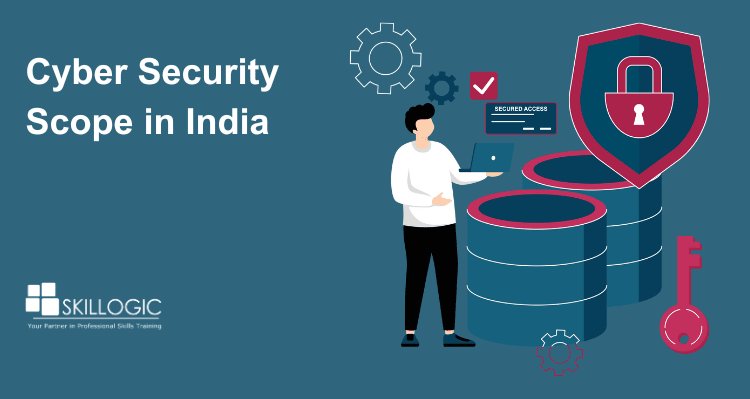Cyber Security Scope in India

In today's digital world, cybersecurity acts as a shield against online threats, keeping our information safe. This article dives into the exciting world of cybersecurity in India, showing why it's so important and what it means for us. We'll take a closer look at what cybersecurity is all about and why it matters to everyone. By the end, you'll see how cybersecurity impacts our daily lives and why it's worth paying attention to in our increasingly connected world.
The Landscape of Cybersecurity in India
Cybersecurity involves protecting computer systems, networks, and data from unauthorized access, attacks, or damage, employing techniques like encryption, firewalls, and intrusion detection systems.
In India, the cybersecurity industry is rapidly evolving, driven by increased digitization, government initiatives, and rising cyber threats. It encompasses a wide range of players including government agencies, private companies, and cybersecurity startups.
The cybersecurity market in India is experiencing a significant surge, projected to grow from USD 4.70 billion in 2024 to an impressive USD 10.90 billion by 2029. This growth is fueled by heightened awareness, regulatory requirements, and the growing adoption of digital technologies across various sectors.
Refer:
- Why is Cybersecurity Important?
- information security vs cyber security
- How Can I Be a Cyber Security Expert
Opportunities in the Cybersecurity Industry in India
The field of cybersecurity offers ample opportunities for growth and success, with cybersecurity companies poised for a bright future due to increasing demand for online security from businesses and governments. According to NASSCOM, India's cybersecurity sector is expected to reach $35 billion by 2025, leading to over 1 million job openings in the country.
Jobs in Cyber Security in India
For those considering a cybersecurity career in India, there's a wide array of job roles available, including ethical hackers, security analysts, engineers, incident responders, penetration testers, consultants, cryptographers, architects, and auditors. These cyber security job roles in India are in high demand as they play a crucial role in protecting digital assets in our interconnected world.
Salary for Cyber Security in India
Several factors can influence the salary for cybersecurity professionals in India. These factors include the level of experience and expertise in the field. Those with more experience and advanced skills typically command higher salaries. Additionally, the demand for cybersecurity professionals in different regions or industries can affect salary levels. Industries or regions facing higher cybersecurity threats may offer higher salaries to attract top talent. Furthermore, specialized certifications and training can also impact salary negotiations, with professionals holding relevant certifications often earning higher salaries.
Glassdoor reports an average annual salary of INR ₹5,00,000 for Cyber Security Analysts in India. Here's a breakdown of the salary packages in major Indian cities:
- A cyber security analyst salary in Bangalore is INR ₹5,50,000 per year.
- The salary for a cyber security analyst in Chennai is an average of ₹4,98,000 per annum.
- The average income for a cyber security analyst in Pune is INR ₹5,00,000 on a yearly.
- A cyber security analysts salary in Hyderabad is INR ₹5,77,500 per year, as per Glassdoor.
- The salary for a cyber security analyst in Mumbai Is an average of ₹4,50,000 per annum.
- The average income for a cyber security analyst in New Delhi is INR ₹6,00,000 on a yearly.
- A cyber security analyst salary in Kolkata is INR ₹5,52,182 per year.
- The salary for a cyber security analyst in Kochi is an average of ₹5,46,318 per annum.

Cyber Security in India - Essential Skills and Education
Thriving in the field of cybersecurity requires a combination of technical prowess and soft skills. Below are the essential skills and educational background necessary for a successful career in cybersecurity in India:
Technical Skills:
- Proficiency in programming languages such as Python and C++ for analyzing and securing computer systems.
- Knowledge of cybersecurity tools like firewalls, antivirus software, and intrusion detection systems.
- Understanding of networking concepts and protocols to identify and prevent cyber threats.
- Familiarity with encryption techniques and cryptographic algorithms to secure sensitive data.
- Ability to use tools like Wireshark and Nmap for network monitoring and vulnerability assessment.
- Experience with cloud platforms like AWS, Azure, or GCP for implementing secure cloud environments.
Soft Skills:
- Strong problem-solving skills to identify and address cybersecurity vulnerabilities effectively.
- Clear communication skills to explain security risks and solutions to non-technical stakeholders.
- Collaborative teamwork to work with different departments to enhance overall cybersecurity posture.
- Business acumen to align cybersecurity strategies with organizational goals and priorities.
- Adaptability and willingness to continuously learn and stay updated on emerging cybersecurity threats and technologies.
Education:
- Bachelor’s Degree: Typically in Computer Science, Information Technology, or related fields.
- Professional Certifications: Pursuing cyber security certifications in India like CompTIA Security+, Certified Ethical Hacker (CEH), or Certified Information Systems Security Professional (CISSP) to demonstrate expertise in cybersecurity.
- Ongoing Learning: Engaging in continuous professional development through workshops, seminars, and online cyber security courses in India to stay current with evolving cybersecurity trends and techniques.
With the right education and cyber security skills in India, you can have a successful and exciting career in cybersecurity.
Refer: How to Become a Cyber Security Expert in India?
Building a Successful Cybersecurity Career in India
Starting a rewarding cybersecurity career in India requires a strategic approach that includes networking, continuous learning, and adaptability to new technologies. Here are instructions to assist you in beginning:
Step 1: Acquire the Necessary Skills
Begin by gaining a strong foundation in cybersecurity. Enroll in reputable cybersecurity courses offered by cybersecurity institutes in India or certifications offered by IIFIS, NASSCOM FutureSkills, CompTIA.
Step 2: Build a Strong Online Presence
Create a professional LinkedIn profile highlighting your cybersecurity skills, certifications obtained from cybersecurity institutes in India, and educational background. Share and engage with cybersecurity-related content on social media platforms. Consider writing blog posts or contributing to cybersecurity forums to showcase your expertise.
Step 3: Attend Cybersecurity Meetups and Conferences
Networking is crucial in the cybersecurity field. India hosts numerous cybersecurity meetups and conferences throughout the year. Participate in these events to connect with professionals, stay updated on the newest advancements, and establish industry relationships.
Step 4: Apply for Internships or Entry-Level Positions
Start your cybersecurity career journey by applying for internships or entry-level positions in cybersecurity firms or IT companies in India. These positions offer practical experience and enable you to utilize your skills in real-life situations.
Step 5: Continuously Update Your Skills
Keep pace with the fast-paced advancements in cybersecurity by consistently perusing articles, blogs, and publications that delve into emerging technologies and methodologies, ensuring you remain well-informed.
Step 6: Network Actively
Participate in cybersecurity and technology-focused gatherings, workshops, and seminars within your local area in India. Forge connections with industry experts, as networking can open doors to valuable job prospects and partnerships.
Step 7: Adapt to New Technologies
Embrace new technologies and tools as they emerge in the cybersecurity landscape. Stay informed about cutting-edge advancements and how they can enhance your skill set.
By following these steps, you can embark on a successful career in cybersecurity in India, focusing on networking, continuous learning, and adaptability to new technologies.

Emerging Trends and Technologies in Cyber Security
As technology advances, new tools and methods are emerging to enhance cybersecurity.
- AI and Machine Learning: Increasingly used to detect and respond to cyber threats in real-time, enabling proactive defense mechanisms.
- Zero Trust Architecture: Moving away from traditional perimeter-based security, focusing on continuous authentication and authorization, regardless of user or location.
- Cloud Security: With the proliferation of cloud services, there's a focus on enhancing cloud security through tools like CASBs (Cloud Access Security Brokers) and CSPM (Cloud Security Posture Management).
- IoT Security: With the growing number of connected devices, there's a need for robust security measures to protect against IoT-related vulnerabilities and attacks.
- Quantum Cryptography: Developing cryptographic techniques resistant to quantum computing, which poses a threat to current encryption methods.
- Extended Detection and Response (XDR): Combining multiple security tools and data sources to provide more comprehensive threat detection and response capabilities.
- DevSecOps: Integrating security practices into the DevOps pipeline to ensure security is prioritized throughout the software development lifecycle.
- Identity and Access Management (IAM): Strengthening access controls and identity verification processes to prevent unauthorized access to sensitive data and resources.
- Cybersecurity Automation: Leveraging automation for tasks like threat hunting, incident response, and vulnerability management to improve efficiency and response times.
- Biometric Authentication: Increasing adoption of biometric authentication methods for enhanced security and user authentication processes.
Refer: Leading Cyber Security Tools
Future Outlook for Cyber Security in India
In India, cybersecurity is becoming increasingly important as more people and businesses go online. The cybersecurity industry, which helps protect digital information from hackers and cyber attacks, has been growing rapidly. In 2021, it generated around $9.85 billion in revenue, with an impressive 40 percent annual growth rate. This growth is expected to continue, with industry sources predicting that by 2025, cybersecurity revenues could reach as high as $35 billion.
As India's digital economy continues to expand and more critical infrastructure sectors rely on digital systems, the need for robust cybersecurity measures becomes paramount. Cybersecurity services and products play a crucial role in safeguarding sensitive data, financial transactions, and essential services from cyber threats. With increasing digitization, the demand for cybersecurity solutions is expected to soar, driving further growth in the industry.
The projected growth of the cybersecurity industry in India signifies significant opportunities for businesses and professionals in the field. As the country invests more in cybersecurity infrastructure and technologies, there will be a growing demand for cybersecurity professionals, innovative cybersecurity solutions, and advanced cybersecurity services to protect against evolving cyber threats.
End Note
Cybersecurity in India faces ups and downs ahead. As technology grows, so do the risks to our digital safety. Yet, by working together and using new tech wisely, India can become a top player in cybersecurity. Learning from others, using the best tools, and teaching everyone about online safety will be key. By following these steps, we can make sure India stays safe online, protecting our important digital stuff and keeping our country secure for years to come.
SKILLOGIC is a premier provider of certification training in various domains, including project management, DevOps, business analytics, ethical hacking, six sigma, and cybersecurity training in India. Their Cyber Security Professional plus Course is highly acclaimed, accredited by prestigious organizations like IIFIS, NASSCOM FutureSkills, and CompTIA. SKILLOGIC's commitment to quality education and industry recognition makes them a top choice for professionals seeking to advance their skills in cybersecurity.

0
2341